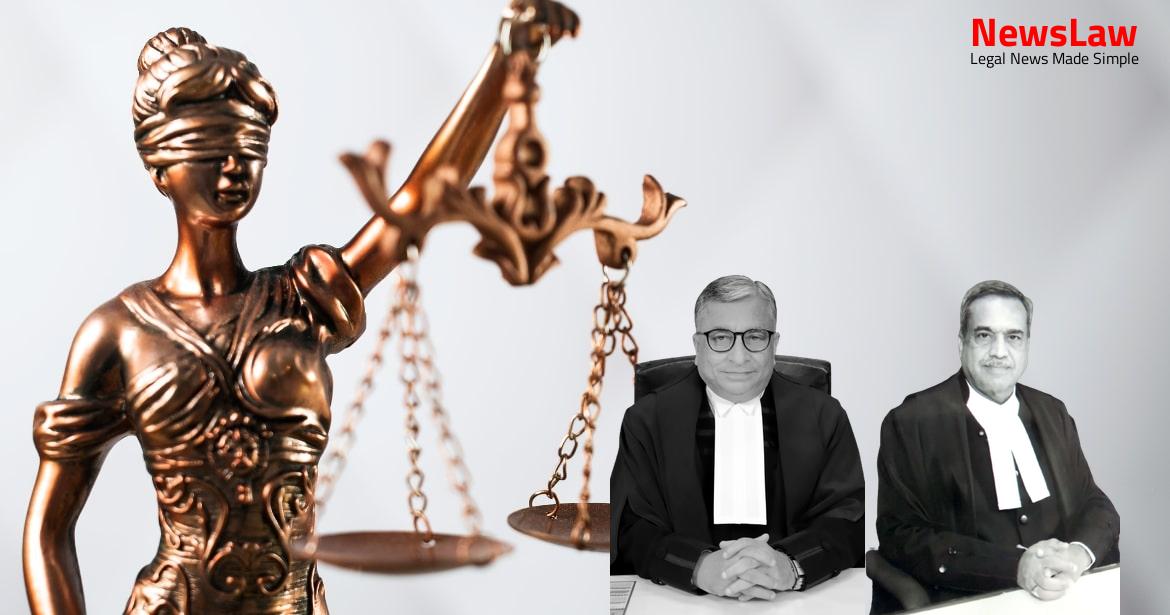In a recent legal case, the court delved into the intricate details of criminal proceedings, emphasizing the necessity of concrete evidence to establish culpability. The judgment sheds light on the limitations of suspicion in implicating individuals, underscoring the critical role of evidence in legal analysis.
Facts
- Investigation was carried out, chargesheet dated 08.01.2016 was filed and cognizance was taken by the Court dealing with vigilance cases vide order dated 11.01.2016.
- A discharge petition under Section 239 of the Cr.P.C. was filed by the Appellant, which was dismissed by the learned Special Judge vide order dated 04.07.2018.
- M/s RPCL agreed to complete the project within the extended completion period instead of going for Arbitration/Court of Law.
- Arbitral proceedings were commenced and an award dated 25.11.2007 was passed.
- A request was made to the AG regarding the maintainability and enforceability issues relating to the interim award.
- Allegations of malpractice and financial irregularity were levelled against the Appellant and some others.
- An FIR was requested to be registered against the Appellant by the Secretary, JSEB, and the Vigilance Commissioner.
- The High Court affirmed the dismissal of the discharge application filed by the Appellant.
- The Appellant was not involved in the decision-making process at certain key meetings.
- Approval of additional B.O.Q. and items was to be given by JSEB immediately.
- The criminal case against the Appellant and others was registered for various offences under IPC and PC Act.
- Progress of the project was found to be very slow during the review.
- The Appellant did not mention the instructions given by the previous Chairman of JSEB regarding referral of the matter for arbitration.
- The High Court found fault with the Appellant for proposing an agenda on wrongful implementation of the award, which was challenged belatedly.
- The High Court dismissed the revision petition after finding a prima-facie case against the Appellant.
- The JSEB Board decided to grant an extension up to July 2007 instead of going for arbitration or legal action to cancel the contract.
- The decision to cancel the contract was mutual and not taken by the JSEB and its members.
- The instructions sought by the Appellant in the agenda dated 08.06.2007 were either based on the advice of the AG of Jharkhand or in continuation of the previous Board decision.
- A committee was constituted by JSEB to suggest names for the appointment of an arbitrator, and Mr. Ramayan Pandey was appointed as the arbitrator.
- The Arbitrator passed an interim award in favor of RPCL on 25.11.2007.
- The High Court observed sufficient material to make out a prima-facie case against the Appellant for framing of charges.
- The High Court affirmed the order of the learned Special Judge based on the evidence and circumstances.
Also Read: Withdrawal of Prospective Resignation: Legal Analysis
Arguments
- Appellant did not have decision-making power or financial authority to carry out the contract and award passed.
- Verbal instruction for termination of contract given by previous Chairman was overturned within two months by the new Chairman in a meeting where Appellant was not a member.
- Culpability alleged against the Appellant for not putting up agenda for cancellation of the contract amounts to abuse of power.
- No allegation of illegal gratification, undue benefit, or disproportionate assets against the Appellant.
- Prosecution failed to establish any nexus between the Appellant and RPCL to whom the benefit is alleged to have been made.
- Appellant had put up the matter before higher authorities for instructions and did not act unilaterally.
- No decision-making authorities apart from Director of Finance have been made accused in the case.
Also Read: Acquittal in Kidnapping and Abduction Case: Court’s Legal Analysis
Analysis
- The Court has a limited scope of inquiry and must determine if a prima-facie case has been made against the accused.
- No evidence of illegal gratification or disproportionate assets has been found against the Appellant.
- The offence of conspiracy cannot be established on mere suspicion or inference without cogent evidence.
- The Appellant suggested a mode of payment in line with a Board office order after the award was passed.
- No incriminating material or money was seized from the Appellant’s house during the investigation.
- The AG’s approval of the award implementation cannot be solely influenced by the Appellant.
- Allegations of conspiracy require evidence of an agreement for an illegal act.
- Suspicion alone is not sufficient to implicate the Appellant in the alleged offences.
- The essence of criminal conspiracy can be proven through direct or circumstantial evidence.
- The highest law officer’s advice on legal matters cannot be the subject of prosecution without restrictions shown on payment methods.
- Insufficient grounds exist to cast grave suspicion on the Appellant.
- The Court must consider broad probabilities, weight of evidence, and any basic infirmities before framing charges.
- The Supreme Court laid down a proposition of law in the case of Central Bureau of Investigation, Hyderabad Vs. K. Narayana Rao stating that without evidence of connivance or conspiracy, criminal proceedings cannot be sustained.
- The High Court quashed the criminal proceedings against Umesh Kumar, as there was no evidence of connivance or conspiracy except for two facts related to the payment to the contractor.
- Reference can be made to the judgment in Union of India Vs. Prafulla Kumar Samal (1979) 3 SCC 4 for further insights on similar matters.
- The court concluded that the ingredients of the alleged offenses were not prima-facie made out against the Appellant.
- As a result, the instant appeal was allowed and the impugned order was set aside.
- The Appellant is discharged in the criminal proceedings arising out of Special Case No.02 of 2011.
- The High Court was found to have erred in refusing to exercise the revisional powers vested in it under Sections 397 and 401 of the Cr.P.C. and dismissing the criminal revision preferred by the Appellant.
Also Read: K. vs. The State of Rajasthan)
Supreme Court Judgment Upholds Acquittal in Falsifying Date of Birth Case
Case Title: PUSHPENDRA KUMAR SINHA Vs. THE STATE OF JHARKHAND (2022 INSC 860)
Case Number: Crl.A. No.-001333-001333 / 2022



